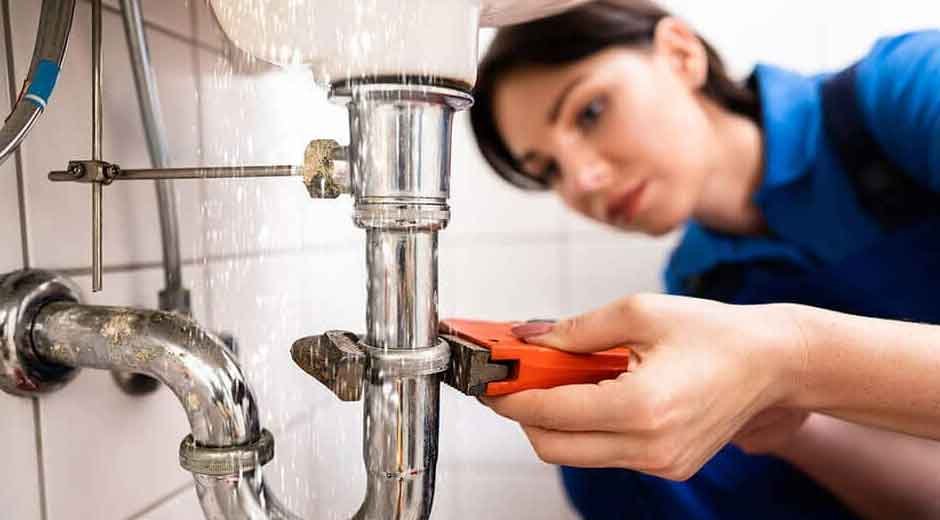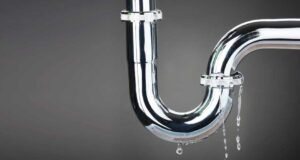You’d be surprised how often water leaks go unnoticed in rentals. They creep in quietly, dripping away behind walls, under floors, or inside cupboards.
By the time you notice a damp patch or a musty smell, the damage (and the water bill) has already piled up.
These sneaky leaks can cause serious headaches if left unchecked, but spotting them early can save you a heap of stress, money, and mould trouble later on. In this article, we’ll show you how to track them down before they turn into bigger problems for you.
Contents
Inspect the Property Regularly
A quick monthly check can make all the difference in catching leaks early.
Start with the usual suspects—under the bathroom and kitchen sinks—since that’s where older pipes and loose fittings tend to hide their mischief. Look out for water stains, damp patches, or a bit of mould that wasn’t there before.
Next, take a peek behind your washing machine and dishwasher. Those hoses can wear down over time, and a slow drip there can go unnoticed for weeks. Toilets are another common culprit, especially around the base, where moisture can quietly build up.
It doesn’t take long, but keeping an eye on these areas can save you from the hassle of surprise leaks, water damage, and that dreaded musty smell creeping into your home.
Try the Water Meter Test
If you suspect there’s a hidden leak, here’s a smart trick that can help you find out for sure.
Start by turning off everything that uses water, including taps, the dishwasher, the washing machine, and your garden hose if you have one.
Then, find your water meter, usually in a small box near the front boundary of your property close to the footpath, and jot down the current reading.
Now, leave everything off for about an hour. When you come back, check the meter again. If the numbers have changed, there’s a good chance water’s escaping somewhere it shouldn’t.
Especially during Aussie summers, which are notoriously known for being dry with water bills climbing fast, every drop counts. This simple check can help you stay on top of leaks, keep your usage in check, and avoid bigger plumbing dramas later on.
Use a Moisture Meter to Stay Ahead
When you’re renting, the last thing you want is to discover hidden water damage that’s been quietly building up over time. We hear you.
Consider a moisture meter, which is a real game-changer. It detects damp spots before they turn into serious problems that your landlord might blame you for later.
They’re simple to use, too. Just press the device against walls, floors, or even behind furniture where you suspect there’s an issue. Within seconds, you’ll know if there’s excess moisture lingering beneath the surface. It’s like having X-ray vision for leaks.
You don’t need to spend a fortune either. There are affordable models from brands like Protimeter and Trotec that do the job well without breaking the bank.
Whether you choose a basic or digital version, it’s a small investment that can save you from much bigger costs down the line.
Check Your Water Heater and Plumbing
Staying on top of the key spots where leaks often start can make a big difference in keeping your rental dry and damage-free. For instance, older fittings and ageing systems tend to wear out quietly, so a quick inspection now and then can be a true lifesaver.
Begin with your water heater—look for any signs of rust, corrosion, or dampness around the valves and connections. These small clues often point to issues starting beneath the surface.
Next, have a look under sinks, behind toilets, and around taps. These areas are classic trouble zones where slow drips or loose fittings can go unnoticed. A small tightening or quick part replacement can often prevent any issues with the plumbing from worsening.
However, if you notice a problem you can’t handle yourself, reporting anything unusual right away gives your landlord a chance to sort things out before it turns serious.
Watch Out for Changes in Water Flow
Did you know that water pressure can be one of the first clues that there’s a hidden leak somewhere in your rental’s plumbing?
If it suddenly drops while you’re doing the dishes or having a shower, water might be escaping behind the scenes instead of flowing where it should. Kitchens and bathrooms are the most common trouble spots since they get the most use.
That’s why it’s best to keep an eye out for the warning signs—damp patches or discoloured areas on walls and ceilings. Also, listen for odd pipe noises like hissing, dripping, or that telltale gurgle.
Talk to Your Landlord
Whenever you notice anything unusual, let your property manager know straight away.
Good communication helps both of you work together to sort things out effectively to prevent major damage and avoid hefty repairs. It also shows that you actually care about the condition of the place.
Besides, when it’s time to move out, everything you did pays off, especially when paired with a professional bond guarantee cleaning service.
As your lease ends, such cleaners know how to tackle those hidden spots where moisture or mould builds up, leaving the property fresh, spotless, and definitely inspection-ready.
They can also restore areas affected by minor water marks or dampness, giving you the best chance of getting your full bond back without the stress.
Also, their expert eye ensures nothing gets overlooked during the final clean, so you can move out with confidence knowing everything’s been taken care of.
Conclusion
Finding hidden leaks might not sound glamorous, but it’s honestly one of the smartest moves you can make as a renter.
Your future self will definitely thank you for catching that sneaky drip before it turns your bathroom into a swimming pool.
Plus, you will sleep better knowing your place isn’t harbouring any piping issues behind the walls. So, stay vigilant, and remember—every leak caught early is money saved and stress avoided.








